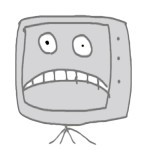 🔗
🔗
This article shows a way to consume news media in a healthier, more effective way.
World news is widely available to most people in developed countries. The volume of information (TV, Radio, online news) exceeds what a human being can digest on a daily basis. When it comes to quality though, it’s extremely uneven. We’re faced with a choice here: quality vs quantity. Let’s see it like a diet: we can decide to consume a huge quantity of nonsensic news, become incredibly stupid and depressed like lots of people OR pick what we really want to know to reach our goals and be informed.
By being more frugal and selective with the news we consume, you will save your time and your mental energy.
I decided to follow a media diet several years ago because I couldn’t take what I was seeing on TV. It was in the 90’s, at the time the internet was not mainstream and the news was either about wars, shootings, famines, bombings or celebrities bullshit.
Nothing has changed since, although the means of broadcasting this info have multiplied.
To respond to that, I used an approach that worked for me: I decided what news I needed to know and cut the rest by 70% .
The following “method” summarizes this approach.
I wrote this assuming that you wish to reduce the time you spend reading/watching TV/the Internet.
1 – What do you want to know? 🔗
the whole approach revolves around this simple question:
“What do I want to know?”
Like said earlier in this message, available news is uneven, so if you want to know about a six-headed baby born in Ohio last week or how the president pardoned the turkey for Thanksgiving that’s fine: the news will give you plenty of that randomness all day.
However, if you need information relevant to your business, lifestyle or what’s going on in the world at large, then applying focus is probably the right path. In short: before turning the TV on or launching your browser, think about what really matters to you. If you have that at heart as you watch something, your mind will naturally focus on what is important, if you don’t your mind will go with what it sees first: guess what?
2 – You are the boss 🔗
Often, we accuse the media of dumping an “information overload” on us poor citizens, we feel bombarded by information and, at least in my case I used to feel powerless in front of the insane amount of commercials and messages that are displayed everywhere. But once again, it’s like food: it’s available but we don’t have to consume it. Of course we can’t control what’s posted in the streets, but we can switch TV off and shut down our computer. It’s about our brain here: we decide what to put in it. It’s a safer approach to acknowledge that we are not victims of the information overflow: we can decide anytime when to stop it.
That means: try and switch off TV in the middle of a program that you don’t really like, for instance.
How does it feel?
Better?
If it feels a little empty, why not replace it with something else? (make love, meditate, talk nonsense with a friend, anything else will do).
That’s one possible expression of freedom :)
3 – Toxic news: Garbage In – Garbage Out 🔗
To continue with the analogy of food: “Junk Food” has an equivalent in the news world. Informational Junk Food doesn’t make us overweight, but it makes us depressed and anxious. Learning about a grisly murder is not going to make us smarter, wiser, better.
It will stimulate our curiosity (everybody’s fascinated by death, to some extent) but unconsciously it’ll put our mind in distress.
“Garbage In Garbage Out”, that’s what computer scientists say: if you put wrong data in a computer, it can only give you a wrong answer.
If we hear of people being killed in horrible circumstances, will our computer-mind produce anything else than panic?
Unfortunately news provide a lot of that type of crap, simply because it’s in demand: gossiping and sensational horror stories.
Cutting out most of that kind of “news” will give us a positive outlook and save a lot of our mental resources to feel better.
Just identify what’s your junk food of choice, I know mine, I try and stay away from it as much as I can. I know, it’s not easy but the reward is sanity.
4 – You don’t HAVE to know 🔗
It’s not our duty to know what’s going on in the world, especially when we can’t do anything to improve the situation.
There is a lot going on that is unfair, if not atrocious, but what point is there to worry about it?
Is it really going to help people suffering from a military crackdown if you loose sleep over them?
Probably not.
How about focusing your attention on the bad news that you can do something about?
This way you can act upon it: donate something, sign a petition, write to people unjustly put in jail. It reduces the anxiety and the disempowering feeling and gives us the satisfaction of making a difference.
Of course you can be aware of world news, even when you can’t do anything about it, but getting the message hammered in 30 times a day will do nothing but depress you. Off with that.
We aren’t in an information age, we are in an entertainment age – Tony Robbins
Books that I liked about this topic:
- The Information Diet: A Case for Conscious Consumption
– Clay A. Johnson - Manufacturing Consent: The Political Economy of the Mass Media
– Noam Chomsky – Edward S. Herman